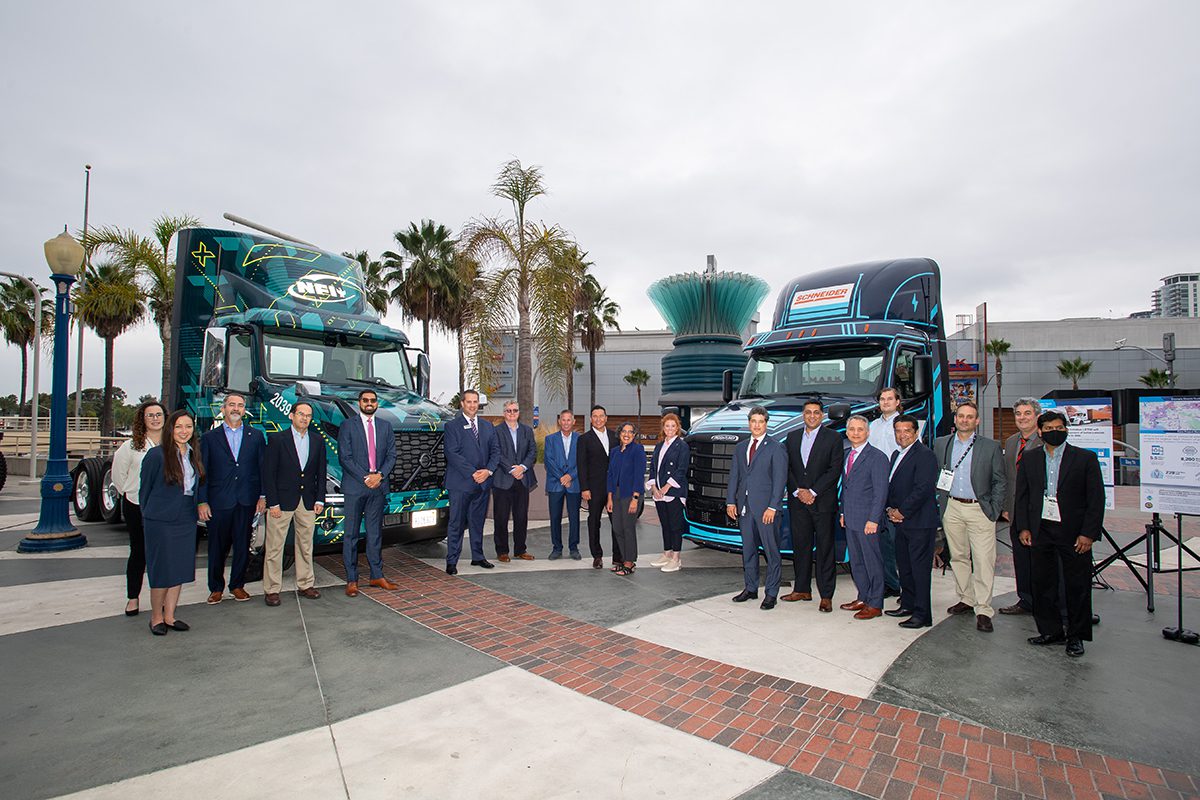It was hard to miss the two battery-electric Class 8 trucks parked in front of ACT Expo on Tuesday morning, August 31, as project partners for the Joint Electric Truck Scaling Initiative, or JETSI, kicked off the conference by announcing a landmark initiative to deploy 100 battery-electric regional haul and drayage trucks across California. The trucks, manufactured by Daimler Trucks North America (DTNA) and Volvo Trucks North America (Volvo Trucks), will be deployed by logistics companies NFI Industries (NFI) and Schneider on freight corridors serving the Ports of Los Angeles and Long Beach, as well as distribution centers across Southern California.
The project, led by South Coast Air Quality Management District (South Coast AQMD), is the largest commercial deployment of battery-electric trucks in North America to date, helping to significantly increase the number of zero-emission heavy-duty trucks available for goods movement while achieving necessary emission reductions. With lead project funders California Air Resources Board (CARB), South Coast AQMD, and California Energy Commission (CEC), this project is the largest investment of its kind.
“We are proud to be a part of this historic initiative here in Southern California,” said Wayne Nastri, South Coast AQMD’s executive officer. “The agency has always been a leader in innovative collaborations that help advance zero-emission transportation and protect the health of our communities.”
The project is poised to reduce five tons of pollutants such as nitrogen oxides (NOx) and particulate matter (PM) annually along Southern California’s I-710 corridor.
The project is poised to reduce five tons of pollutants such as nitrogen oxides (NOx) and particulate matter (PM) annually along Southern California’s I-710 corridor, as well as eliminate 8,247 metric tons of greenhouse gas emissions. Connecting the San Pedro Bay Port complex to inland distribution centers and warehouses, the I-710 sees more than twice the average Los Angeles freeway truck traffic and accounts for 20% of all PM emissions in Southern California. The JETSI project will inform large fleets on the capabilities of battery-electric trucks to ensure the emission reductions achieved are sustainable and improve the air quality for communities most impacted.
“Projects like JETSI are needed to help accelerate the large-scale manufacturing of zero-emission trucks. They also demonstrate to other fleet operators how zero-emission technologies are commercially competitive, especially when it comes to cost savings on fuel and maintenance,” said CARB Chair Liane Randolph. “Putting more of these trucks on our roads and highways as soon as we can is a primary goal of the Newsom administration, and it is crucial to cleaning up the air in communities adjacent to our ports and along the highways now crammed with diesel-powered trucks.”
“Projects like JETSI are needed to help accelerate the large-scale manufacturing of zero-emission trucks.”
The NFI and Schneider zero-emission fleets will operate almost exclusively in disadvantaged communities, replacing the equivalent of more than 690,000 diesel-gallons annually, while also helping to accelerate commercialization of battery-electric commercial vehicles across the market.
DTNA will deliver 50 battery-electric Freightliner eCascadias to Schneider and 30 to NFI. Schneider will deploy the 50 eCascadias within its intermodal operations in Southern California. Volvo Trucks will deliver another 20 VNR Electric trucks to NFI. With the deployment of a combined 50 battery-electric trucks at its Ontario facility, NFI will operate the first 100% zero-emission freight logistics fleet in California. Through the JETSI project, NFI and Schneider will collectively install significant charging infrastructure (50 chargers total), warehouse upgrades, on-site energy storage, and rooftop solar, resulting in more than $16.8 million of regional economic activity from associated construction costs. Over 20 project partners representing charging equipment manufacturers, infrastructure providers, nonprofit organizations, technology suppliers, and more will collaborate on the eight-year project to ensure all aspects of fleet electrification are considered.
The project was funded with $26.98 million from CARB’s California Climate Investments initiative and the CEC’s Clean Transportation Program, $5.43 million from South Coast AQMD, as well as $41.37 million in funding from project partners.
JETSI represents an unprecedented industry-wide collaboration among more than 20 public and private stakeholders. The project was assembled and will be led by South Coast AQMD along with support from CARB, CEC, Schneider, NFI Industries, Daimler Trucks North America, and Volvo Trucks North America. Partners including Green Paradigm Consulting, Power Electronics, Electrify Commercial, Gladstein, Neandross & Associates (GNA), Coalition for Clean Air, CALSTART, Electric Power Research Institute, Ricardo Strategic Consulting, Los Angeles Cleantech Incubator, Black & Veatch and University of California, Riverside. The Mobile Source Air Pollution Reduction Review Committee (MSRC), Port of Long Beach, Port of Los Angeles, and Southern California Edison will be contributing to the project.



